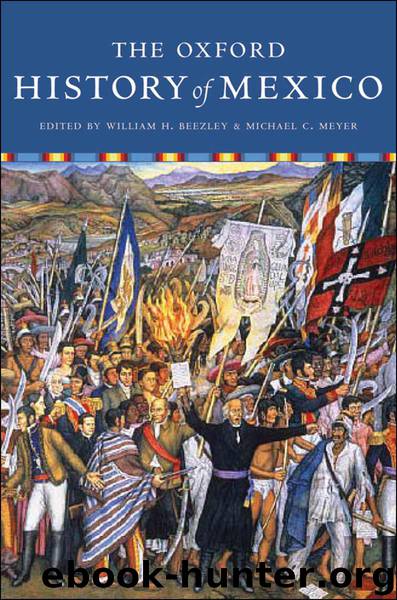The Oxford History of Mexico by Meyer Michael & Beezley William

Author:Meyer, Michael & Beezley, William
Language: eng
Format: epub
Publisher: Oxford University Press
Published: 2010-08-02T16:00:00+00:00
12
BETTERMENT FOR WHOM? THE REFORM PERIOD: 1855–75
PAUL VANDERWOOD
The outcome of the U.S.–Mexican War of 1846–48, the loss of half of Mexico’s national territory, both traumatized and energized Mexicans. It laid bare the weaknesses of the country’s economy and its political system, highlighted the flaws in its social fabric, and raised the specter of further U.S. territorial aggression. At the same time, it emboldened the leaders who aimed to modernize Mexico, as well as a number of ordinary folk demanding a say in their country’s future.
Those hoping to calm the turbulence of the early independence period and to drive Mexico down the alluring pathways offered by the West were called liberals. The political orientation of these liberals ranged from truly radical to extremely moderate, differences that were bound to create controversy within their ranks. But in a broad overview, the liberals yearned to democratize and secularize the country, stimulate capitalist ventures, protect human rights and private property, guarantee equality under the law, and forge a nation out of all the disparate regions whose disunity had led to the just-completed military disaster. And they meant to do all this quickly, come what may.
Their opponents, called conservatives, also believed in their own principles with different degrees of radicalism, endorsing many of the ideas of their adversaries but advocating a much slower pace. They feared that the liberal program would hurl the country into social chaos, stimulating peasant movements like those that had occurred in the 1840s, perhaps including a race war by Indian campesinos (small-scale farmers). Thus, they demanded that the time-tested pillars of order—the army and the church—be retained intact and that efforts to increase the participation of ordinary people in government be restrained. For a short period these points of view were vociferously debated in the public forum. But ultimately the contenders, claiming irreconcilable differences, plunged the country into civil war.
The catalyst for the renewed strife was none other than the previously seen, widely known national figure Antonio López de Santa Anna, nearing age sixty, who was returned to the presidency by a military coup in 1852. General Santa Anna, who demanded that he be addressed as His Most Serene Highness, moved rapidly to fix himself in power, assuming imperial pretensions and demanding military recruits, additional taxes, and obedience from the provinces. The general and his conservative supporters meant to create a highly centralized order in Mexico, devoid of the local elections and popular choice that had been at work for decades now in Mexico’s federalist system. However, the provinces were not about to give up their freedoms, where many caudillos (regional strongmen) and common folk were seething with ambition, fueled by the liberals’ declarations.
Resistance to Santa Anna’s audacities erupted most forcefully in the southern state of Guerrero, where longtime regional strong man Juan Alvarez enjoyed widespread popular support. Alvarez had helped the local commoners receive land and garner overall better treatment from the area’s officialdom, including a reduction in taxes. He had also insisted on recognizing their rights as citizens
Download
This site does not store any files on its server. We only index and link to content provided by other sites. Please contact the content providers to delete copyright contents if any and email us, we'll remove relevant links or contents immediately.
| Africa | Americas |
| Arctic & Antarctica | Asia |
| Australia & Oceania | Europe |
| Middle East | Russia |
| United States | World |
| Ancient Civilizations | Military |
| Historical Study & Educational Resources |
Narcoland: The Mexican Drug Lords and Their Godfathers by Roberto Saviano(806)
07 Holiday in Death(767)
Time Among the Maya by Ronald Wright(584)
The Conquest of New Spain by Bernal Diaz Del Castillo(574)
El Paso and The Mexican Revolution by Patricia Haesly Worthington(565)
Narcoland by Anabel Hernandez(511)
Murder City: Ciudad Juarez and the Global Economy's New Killing Fields by Charles Bowden(481)
The Life and Times of Pancho Villa by Friedrich Katz(453)
Montezuma: Warlord of the Aztecs by Peter G. Tsouras(443)
El Sicario: The Autobiography of a Mexican Assassin by Bowden Charles & Molloy Molly(412)
Textile Fiestas of Mexico by Brautigam Sheri(410)
Street Democracy by Sandra C. Mendiola García(390)
Mexico by John W. Sherman(375)
Resistance, Revolution and Fascism by Anthony Faramelli(367)
The Aztecs by Michael E Smith(345)
General Jo Shelby's March by Anthony Arthur(340)
Drug Lord: A True Story ; The Life & Death of a Mexican Kingpin by Terrence E. Poppa & Charles Bowden(335)
Cantinflas and the Chaos of Mexican Modernity by Jeffrey M. Pilcher(326)
Redeeming the Revolution by Joseph U. Lenti(310)
